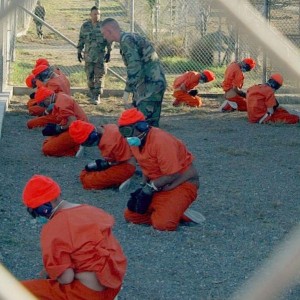Hiding the Ugly Business of Torture
Exclusive: A grisly feature of the “war on terror” was America’s descent into torture, but the powers-that-be have decided that the common folk shouldn’t worry their little heads about this ugliness, reports ex-CIA analyst Ray McGovern.
So, you did not believe in the power of the Deep State? Well, you may change your mind after reading a report in The New York Times that the powers-that-be in Washington are about to deep-six the 6,700-page Senate report based on original CIA cables and other documents that not only to depict savage torture practices during the George W. Bush era, but also show that CIA officials consistently lied in claiming these heinous practices yielded information of any intelligence value.

Some of the original detainees jailed at the Guantanamo Bay prison, as put on display by the U.S. military.
In what amounts to a gross violation of the public trust – not to mention his oath to the Constitution – Senate Intelligence Committee chair, Sen. Richard Burr, R-North Carolina, has recalled all copies and will put the report under lock and key for good – dismissing it as a “footnote in history.”
The only hope for those of us who want to see torturers held accountable is that some patriotic truthteller has – or will – put the report on a thumb drive and send it off to WikiLeaks or some other brave outlet that will publish it.
Small wonder that those agencies and individuals involved in the torture and those – like Burr – who are afraid of the torturers want to keep the report from public view. According to the Times, the full report describes interrogation sessions “in great detail.” It also “explains the origins of the program, identifies the officials involved, and offers details on the role of each agency in the secret prison program” in which detainees were tortured.
Is that why, when copies of the original report were sent to Executive Branch agencies, no one was allowed to read them? Katherine Hawkins, senior counsel at the Constitution Project, immediately called the return of the report to the Senate committee “extremely disturbing.” She labeled “absurd” that no one in the Executive Branch was permitted to read the Senate report, five years in the making.
What Burr’s subservience to the intelligence agencies that he is supposed to be overseeing tells me is that he will shy away from anything implicating former CIA Director John Brennan and his co-conspirators in other shocking activities.
These include implementing CIA’s “Marble” cyber-attack program, which lets it hack into servers and computers and “obfuscate” who the hacker was (as revealed in original CIA documents released on March 31 by WikiLeaks. (Don’t look for that revelation in the Times, however.)
Yes, you heard that right. Former National Security Agency Technical Director William Binney and I are persuaded that the “hack” into the Democratic National Committee was not done by Russia, but rather by a very sophisticated and expensive program allowing the CIA to hack into computers like those of the DNC and leave little “telltale signs” – like Cyrillic letters, for example – in order to “obfuscate” who did the hacking.
This could also explain why former FBI Director James Comey, who seems to be a charter member of the CIA/NSA/FBI Deep State cabal, refused to let his own technicians get physical access to the DNC computers, out of fear they might discover more than they were cleared for.
What are the chances that Sen. Burr or other “overseers” will ask questions about that?
‘Six Ways from Sunday’
Someone just made the innocent suggestion to me that we ought to complain directly to the Senate Minority Leader Chuck Schumer, D-New York – a well meaning, but totally naïve idea. Schumer has been outspoken in expressing his fear of “crossing” the Intelligence Community.
On Jan. 3, 2017, Schumer worried aloud to MSNBC’s Rachel Maddow about Trump taunting U.S. intelligence agencies and its assessments about Russia’s cyber activities.
“He’s being really dumb to do this,” Schumer told Maddow. “Let me tell you, you take on the Intelligence Community; they have six ways from Sunday at getting back at you. So even for a practical, supposedly hard-nosed businessman, he’s being really dumb to do this.” (Maddow, who has eagerly pushed the Russia-gate conspiracy theories, didn’t object to this concept that elected politicians should cower before the mighty I.C.)
With Barack Obama, this fear can be traced back nine years to the first sign I saw indicating that Brennan had inordinate influence over the candidate he signed up to work for in the spring of 2008.
In June 2008, when I heard that then-Sen. Barack Obama had flip-flopped on the key question of whether to hold the giant telecom companies accountable for violating our Fourth Amendment rights against unreasonable searches and seizures and had decided to vote for protecting the telecoms from legal liability, that seemed to me a watershed.
On July 3, 2008 I wrote candidate Obama an open letter titled: “It’s a Deal Breaker for This Intelligence Officer: I speak from 30 years of experience in intelligence work. I don’t know who actually briefed you on the eavesdropping legislation, but the bill is unnecessary for intelligence collection and POISON for our civil liberties — not even to mention the unconscionable retroactive immunity provision.”
Years later, reflecting on the hold that Brennan seemed to have on President Obama, I thought back to Obama’s surrender on the giant telecom companies and reasoned that it was probably Brennan who explained Deep State realities to the candidate in late spring 2008.
Six years later, the blatantly intrusive way in which Obama pulled out all the stops to help CIA Director Brennan prevent publication of a declassified Executive Summary of the Senate Intelligence Committee report on CIA torture scandalized the committee’s lead investigator, Daniel Jones. He gave The Guardian’s Spencer Ackerman an extensive interview in September 2016.
Jones and Ackerman reported that then-Senate Intelligence Committee chair Dianne Feinstein was hell-bent on getting the CIA torture report published. In a March 11, 2014 speech, she argued that a public version would ensure torture “will never again be considered or permitted,” and that CIA interference and foot-dragging meant the Senate faced a “defining moment” testing whether the committee could effectively perform its oversight, “or whether our work can be thwarted by those we oversee.”
On April 3, the committee voted 11-3 to authorize a declassified version of the torture report. Senate Republicans who had long rejected the report’s findings joined Democrats who embraced them.
Yet the CIA had an ally whom Feinstein may not have appreciated: President Obama. The White House announced that same day that the CIA itself would lead the declassification review. The Intelligence Community would effectively choose which of its embarrassments to spare the public from learning.
‘Tortured Some Folks’
Obama’s Chief of Staff Dennis McDonough, acting for Obama, played a central role, backing the CIA’s position at every turn. The fact that the White House chief of staff would personally oversee the negotiations between the committee and the CIA spoke to the gravity of the issue.

Military Police officer Charles Graner poses over Manadel al-Jamadi’s corpse, after he was tortured to death by U.S. soldiers at Abu Ghraib prison.
On August 1, 2014, Obama entered the White House briefing room: “We tortured some folks,” he memorably said. But he added: “It’s important for us not to feel too sanctimonious in retrospect about the tough job those folks [at the CIA] had.”
And so the timid President who, to great fanfare, announced the end of torture (and the closing of Guantanamo, which never happened) ended up making excuses for “those folks” at the CIA, and doing all he could to prevent the American people from learning the particulars of what they had done.
In the end, Sen. Feinstein, with strong help from Senate Majority Leader Harry Reid, D-Nevada, prevailed over Brennan and his lawyerly team of McDonough/ Obama. The sanitized Executive Summary of the report was released on Dec. 9, 2014 just before Congress went home for Christmas.
I suspect that, in the end, Feinstein and Reid confronted Obama with a kind of “nuclear option”: Release the Executive Summary or Sen. Mark Udall (who had just lost his Senate seat and had little to lose) would read it from the Senate floor.
That may be the last time anyone in Washington prevailed over the Deep State.
Ray McGovern works with Tell the Word, a publishing arm of the ecumenical Church of the Saviour in inner-city Washington. He was a CIA analyst for 27 years. In early March 2006 he returned the Intelligence Commendation Medallion given him at retirement, in order to dissociate himself from an agency engaged in torture.





Geen opmerkingen:
Een reactie posten